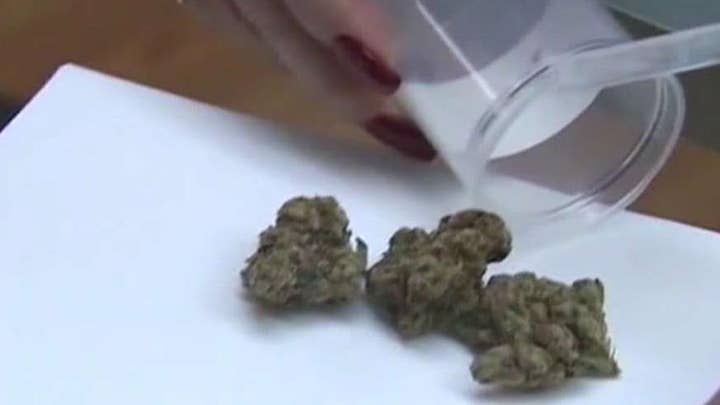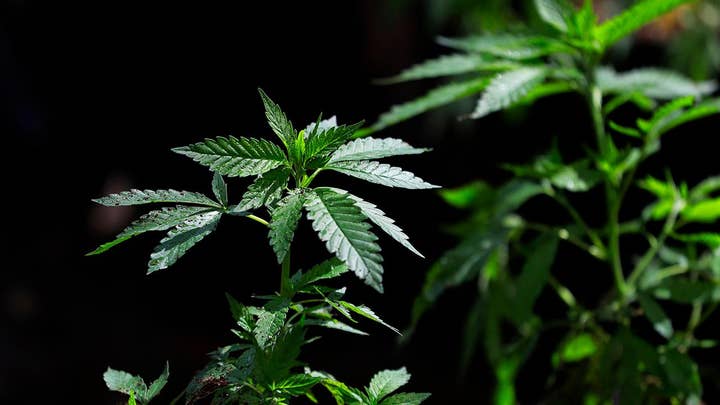America Together: Uplifting images of Americans pulling together during coronavirus pandemic
Every day and in every community, the coronavirus pandemic is bringing out the best in Americans. Take a look at some inspiring images of Americans pulling together in a time of crisis.
Get all the latest news on coronavirus and more delivered daily to your inbox. Sign up here.
The unofficial holiday celebrating all things marijuana is Monday, but the coronavirus pandemic has made the special day a time of melancholy.
It was supposed to be a long weekend of festivals and music culminating on April 20, or 4/20, the code for marijuana’s high holiday. Instead, it has been reduced to an online replica because of stay-at-home orders to curb the pandemic.
Virtual parties and video chats are replacing vast outdoor smoking sessions to mark the rise of legalization and celebrate cannabis culture. The origins of the annual celebration are believed tied to a group of Northern California high school friends, who used the code as slang for smoking pot in the early 1970s.
As the nation’s emerging legal marijuana market braces for an economic blow from the coronavirus crisis, many consumers are reducing spending or going underground for deals.
Some customers could be especially vulnerable during an economic downturn. Among cannabis users in states where its legal, 32 percent have incomes below $35,000 and only 54 percent have full-time employment, according to BDS Analytics. Anyone on a tight budget might be more apt to avoid taxes that go with legal purchases and buy from illicit market dealers.
CLICK HERE FOR FULL CORONAVIRUS COVERAGE
“Stay home,” the National Organization for the Reform of Marijuana Laws, or NORML, said bluntly. San Francisco Mayor London Breed threatened arrests: “We will not tolerate anyone coming to San Francisco for 4/20 this year.”
For businesses, 4/20 is usually their once-a-year Black Friday, when sales soar. Instead, they are reporting up-and-down buying and pondering an uncertain future.
The pandemic means the world economy could face its worst year since the Great Depression in the 1930s. In a sign of what’s to come, U.S. retail sales overall dropped nearly 9 percent in March — a record. Millions are out of work.
As for the holiday, “there’s a somber feeling to this one,” said Jordan Lams, CEO of Pure CA, which specializes in marijuana extracts and does business as Moxie brand products. Before the outbreak, “it was going to be the biggest 4/20 in history,” Lams said.
Steve White, CEO of Arizona-based Harvest Health & Recreation, said he’s watching to see if consumers treat marijuana more like beer or toilet paper when money runs short.
When the economy tumbles, beer sales traditionally spike. With toilet paper, panic-buying might empty shelves but people do not use more of it. They just buy less later.
It will be a telling year, because no one in the relatively new industry knows if sales will plunge, stay flat or even rise.
“Do people buy less cannabis, or does it become more ingrained as part of their daily life?” White said.
The uncertainty in the market poses the latest challenge for an industry that’s expanded in some form to all but a handful of states.
The risks are spotlighted in California, where businesses contend with hefty taxes, an illicit market that still dwarfs the legal one and a tourism-reliant economy that’s crippled by virus restrictions.
Because cannabis remains illegal at the federal level, most banks don’t want to do business with pot companies and they aren’t included in the coronavirus rescue package that will help other businesses.
CORONAVIRUS: WHAT YOU NEED TO KNOW
Steve DeAngelo, co-founder of Harborside dispensaries in California, said it’s difficult to predict what’s next, with no template for how cannabis consumers will react in a deep economic downturn.
Still, he notes that the industry has endured for years through times good and bad, even when consumers had only one option: illegal purchases. Consumers who see marijuana as part of their daily routine will keep coming back, he predicted.
But, for businesses, there will be a “sorting out,” DeAngelo said. Companies with strong brands and cash reserves are likely to fare better in a poor economy; those saddled with heavy debt and that made too-rosy promises to investors will face challenges.
“There is not going to be an extinction moment,” DeAngelo said. “It’s going to prove more resilient than many, many other industries.”
The Associated Press contributed to this report.












































